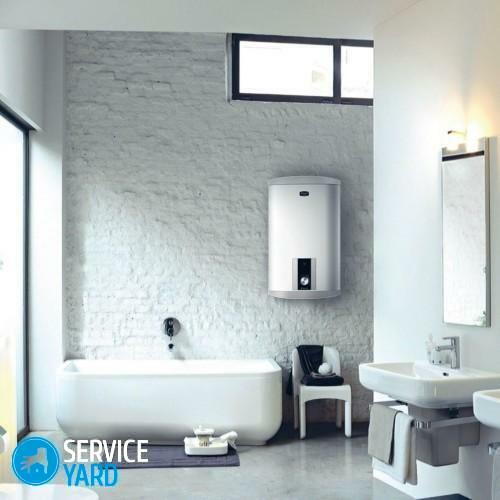
- Equipment features
- Gas column safety
- How to choose gas water heaters?
- Which water heater is better - gas or electric?
- Useful advices
Every person tries to create the most comfortable living conditions for his life, among which hot water supply of residential premises plays an important role. If your house is not connected to a central hot water supply system, then the most practical solution is to buy a flow-through gas water heater.
to content ↑Features of
Gas home water heaters have a number of advantages compared to power-operated appliances:
- Ease of installation and commissioning;
- The cost of gas is much less than the price of electricity;
- No stringent requirements for water hardness;
- Compact design;
- Possibility of heating unlimited amount of water;
- Reliability and durability of use.

Important! The flow-through gas heater is switched on automatically, which occurs simultaneously with the turn of the hot water tap you performed, and the equipment is also automatically turned off.
However, like any appliance, gas water heaters have a number of drawbacks:
- It is absolutely necessary to install a chimney and a high-quality ventilation system that will be responsible for diverting the products of combustion of gas beyond your living space;
- The water pressure in the system must be at least 0.25 atmospheres - about one and a half liters per minute;
- To install a gas flow-through water heater, you need to collect a number of permissive documents and conclusions from the relevant services.
Gas Column Safety
Gas heaters are the safest devices for arranging hot water in a residential building. Their reliability is provided by a special system that protects the design from overheating.
Each column is equipped with the following safety devices:
- Proximity sensor. It performs the function of temperature control, and in case of its excessive increase, gives a command, which closes the gas supply valve.
- Control unit. Due to the user-friendly control panel, the user has the ability to control all functions and processes - temperature, pressure, power, etc.
- Flow sensor. Performs control over the water flow temperature in case of overheating - with its help, the gas supply is closed to the system.
- Electrode for controlling the force of a flame. Since the construction of the water heater does not have a continuously working wick, the least amount of combustion products enters the environment.
- Valve of protection. With the help of this element, control over the presence of a flame in the burner is carried out, and accordingly, protection against an emergency gas outlet.
How to choose gas water heaters?
All modern devices for heating water using gas do not require arcing the wick by hand, but start the work due to the built-in automation.
Ignition type
There are several basic ignition options:
- by connecting to the mains;
- due to the built-in piezoelectric element;
- thanks to batteries or the use of a battery;
- thanks to the built-in hydro generator.
Important! The most economical are the last two types of construction.
Type of combustion chamber
Also gas flow-type water heaters differ in the type of combustion chamber structure, which can have an open or closed design.
Important! Closed cameras are more environmentally friendly and safe to operate.
Power
The main characteristic by which you can correctly choose a flowing gas water heater is the power of the device. Here the conditions will be as follows:
- 19 kW provide room of about 5 liters heated to a temperature of 50 degrees water;
- devices for 24 kilowatts provide about 7 liters of hot water from the tap;
- the most powerful speakers for 28 kilowatts - from 8 liters.

When deciding how to choose a gas water heater, give preference to devices with the power that is necessary for your family, because this figure has a direct effect on the cost of the installation.
Important! For a small family of 1-2 people it is quite enough to install a column with a capacity of 19 kW, and if you use several water intake points, you may need more powerful equipment.
to content ↑Which water heater is better - gas or electric?
Unlike electric systems for water heating, gas flow-through water heaters have a number of positive qualities:
- compact design;
- attractive appearance;
- simple operation;
- durability and safety of use;
- unlimited amount of heated water;
- economic benefits, which is provided by a lower cost of gas compared to electricity.
Useful advices
When installing a gas flow-through water heater, follow the following instructions and procedure:
- Check the water supply pressure, which must not be less than 0.1 atmospheres;
- The attachment point of the equipment must be made of non-flammable building materials.
- The minimum area of the installation room should be more than 6 m2 for a closed combustion chamber design and 8 m2 for open chambers.
- Organize a decent ventilation level of the room where a gas flow-through water heater will be installed.
- Each device is accompanied by detailed instructions on the scheme and the way it is connected and installed.
The instantaneous water heater is installed according to the following sequence:
- Installing the hood.
- Setting the column.
- Connection to the central water supply.
- Mounting of nozzles for the outlet of heated water.
- Connection of equipment to the gas supply system.
In this article we have told you about the features of selection and installation of flow-through gas water heaters and we hope that your house will be pleased with affordable comfort and hot water.
